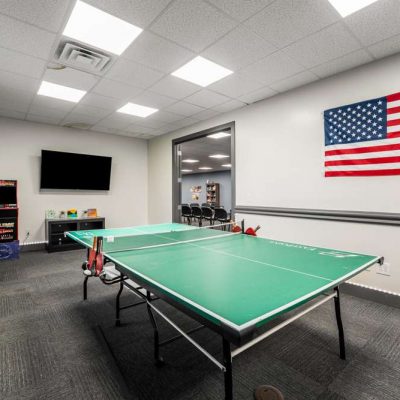Naltrexone Treatment, Uses & Effects
With the opioid crisis impacting millions worldwide, the need for effective addiction treatment methods has never been more pressing. According to the World Health Organization, an estimated 58 million people globally misuse opioids, leading to a staggering 500,000 deaths annually. To help combat this, Naltrexone, (a form of medication-assisted treatment) has been used not just as a treatment approach, but as a critical tool in treating substance use disorder. At Nashville Treatment Solutions, we use Naltrexone and Vivitrol as a vital form of treatment to help individuals suffering from opioid addiction and alcohol use disorder.
You are not alone. You deserve to get help.
Nashville Treatment Solutions is an industry leader in addiction treatment. Our team of top medical experts specialize in dual diagnosis treatment and are committed to ensuring that each patient is treated as an individual. Call us today, we’re available 24/7.
What is Naltrexone?
Naltrexone is a specialized medication classified as an opioid antagonist. Its primary role in addiction management is to obstruct the euphoric and sedative effects typically associated with opioid and alcohol use. By dampening the subjective experience of intoxication, it reduces cravings and compulsion, acting as a stabilizing force in the journey towards recovery.
Tour Our Rehab Programs in Nashville






How Does Naltrexone Work?
Naltrexone is an opioid antagonist, which means it works by binding to opioid receptors in the brain and blocking their activation. Naltrexone does a number of things including the following:
Binding to Opioid Receptors: Opioid receptors are responsible for the effects that opioids, such as heroin or prescription drugs, have on the brain. When opioids are consumed, they bind to these receptors, causing a range of effects from pain relief to euphoria.
Blocking the Effects of Opioids: Naltrexone has a high affinity for these receptors, meaning it prefers to bind to them. When it does, it effectively blocks the receptor, preventing opioids from binding to and activating them. However, unlike opioids, Naltrexone doesn’t activate the receptors; it merely occupies them. This means that if someone consumes opioids while on Naltrexone, they will not experience the usual effects, including the euphoria or “high.”
Reduction in Reward Sensation for Alcohol: Although the primary use of Naltrexone was for opioid addiction, it’s also approved for treating alcoholism. The exact mechanism for this is not entirely understood. However, it’s believed that alcohol, like opioids, induces the release of endorphins, which then bind to opioid receptors, producing some of the pleasurable effects of alcohol. By blocking these receptors, Naltrexone reduces the rewarding sensations associated with alcohol consumption, leading to decreased desire to drink.
Reduction in Cravings: By blocking the euphoric effects of opioids and the reward sensation from alcohol, Naltrexone can reduce the cravings associated with these substances. Over time, as the person experiences reduced or no pleasure from substance use, the psychological drive to consume the substance can decrease.
Naltrexone Side Effects
Naltrexone is generally well-tolerated, but like all medications, it can have side effects. The severity and frequency of these side effects can vary among individuals. It’s essential for patients to be aware of potential side effects and to communicate any concerns or unusual symptoms to their healthcare provider.
Common side effects of Naltrexone include:
Gastrointestinal Issues: This includes nausea, vomiting, diarrhea, abdominal pain or cramping, and loss of appetite.
Nervous System Effects: These can manifest as headaches, dizziness, nervousness, fatigue, or insomnia.
Psychiatric Effects: Anxiety, irritability, and mood swings might be experienced by some individuals.
Muscle and Joint Pain: Some people may experience muscle or joint aches.
Skin Symptoms: This might involve rashes, itching, or increased sweating.
Injection Site Reactions (for Vivitrol): As Vivitrol is an injectable form of Naltrexone, some people may experience pain, redness, swelling, or tenderness at the injection site.
Is Naltrexone Addictive?
One of the fundamental advantages of Naltrexone is its non-addictive nature. It does not produce any narcotic effects, and thus there is no potential for misuse or development of dependency on Naltrexone itself.
Naltrexone vs Vivitrol
Understanding the distinctions between Naltrexone and Vivitrol can be a tad confusing, primarily because Vivitrol is, in essence, a form of Naltrexone. Both play crucial roles in the field of addiction medicine, however there are some differences:
Naltrexone
- Form: Naltrexone is typically available as an oral tablet, often prescribed under the brand names Revia and Depade.
- Dosage: The oral tablet is usually taken once a day, though some patients may be advised to take it less frequently.
- Mechanism: Naltrexone is an opioid antagonist. It binds to the opioid receptors in the brain, blocking them from being activated by opioids or alcohol. This effectively reduces cravings and the euphoric effects associated with these substances.
Vivitrol
- Form: Vivitrol is an extended-release, injectable form of Naltrexone. It’s administered as an intramuscular injection.
- Dosage: Because it’s an extended-release formulation, Vivitrol is typically given once a month.
- Advantages: One of the primary benefits of Vivitrol over oral Naltrexone is adherence. With only a monthly injection required, patients don’t have to remember to take a pill daily, which can be particularly advantageous in addiction treatment where consistent medication intake can be a challenge.
- Mechanism: Being a form of Naltrexone, Vivitrol works in the same way—by acting as an opioid antagonist, blocking the effects of opioids and alcohol.
Comparison and Considerations:
- Convenience: Vivitrol can be seen as more convenient for many patients due to its once-a-month dosing schedule compared to the daily intake of oral Naltrexone.
- Cost: Vivitrol can be more expensive than oral Naltrexone, so insurance coverage, financial considerations, and available resources may influence a patient’s choice.
- Adherence: The extended-release nature of Vivitrol often leads to better adherence, especially in patients who might forget or neglect to take daily medications.
- Initial Detox: Before starting on Vivitrol, patients must be opioid-free for a minimum period (usually 7-10 days) to prevent sudden opioid withdrawal symptoms.
How Does Naltrexone at Nashville Treatment Solutions Work?
Other Services We Offer
Beyond Medication-Assisted Treatment, we offer a robust array of therapies and programs designed to empower our clients’ recovery journeys. These include:
- Dialectical Behavioral Therapy (DBT)
- Cognitive Behavioral Therapy (CBT)
- EMDR Therapy
- Family therapy
- Relapse Prevention
- Psychoeducation
- Adventure Therapy
- Psychiatry
- Individual Therapy
Each modality contributes to a holistic healing environment, addressing the multifaceted nature of addiction and providing the tools necessary for long-term success and well-being.
Begin Medication-Assisted Treatment in Nashville Today!
Call us now at (615) 234-9071 or verify your insurance now.











